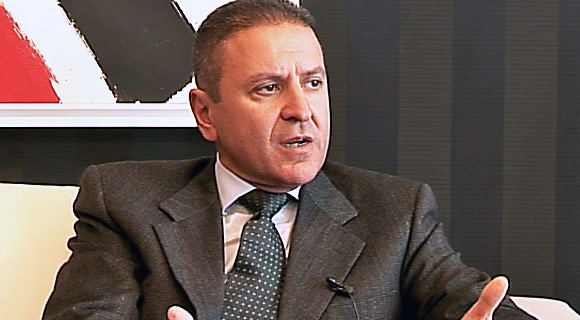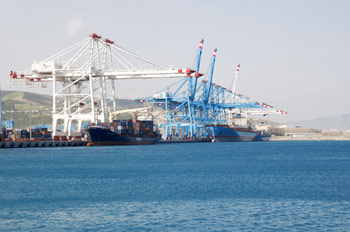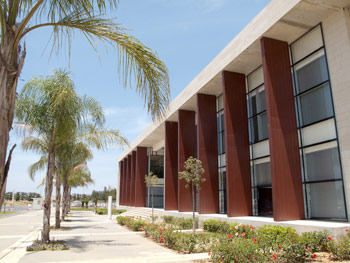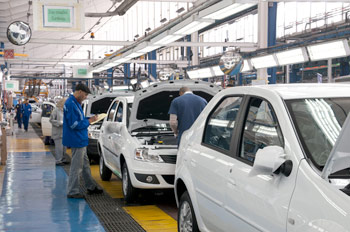Tanger Free Zone: Important Tanger Med Port & Free Zone In Morocco
Tanger Free Zone, CEO, Jamal Mikou
Tanger Med (the Tanger Med port): It is the only port constructed in 21st century. So we are the first to benefit from the latest harbor technology
Interview with Jamal Mikou CEO of Tanger Free Zone

We would like to know the main characteristics of this region. Why must this zone be of interest to investors, businessmen, individuals and tourists? What are the advantages of this region?
Firstly, the Tanger region has a history, the Tanger region was international and the Tanger region, out of many other regions in Morocco is very well recognized by the United States. For your information, the Tanger region also holds a rather particular bond with the United States since it’s the first embassy outside the United States that is known to the American world and the only monument classified as American outside the United States.
Then there’s the geographic position: we are located on the Gibraltar strait which is of strategic importance in this part of the world, the Tanger region has an important value and at the same time, this region (depending on the situation which we find ourselves) can either be a passage to Africa or a passage to Europe. We have many foreigners that lived in this zone giving us a global atmosphere. Thus, it’s the region’s history that creates its promising present and the future.
Tanger Med (the Tanger Med port): It is the only port constructed in 21st century. So we are the first to benefit from the latest harbor technology
Indeed, this region is known for its history. Still regionally speaking, what are the great projects for the future of the Tanger region?
For almost 10 years now, the Tanger region is part of the country’s current dynamism. As you have realized during your stay, we are in the infrastructure phase with an impressive level of development so automatically, the Tanger region is integrated in this phase. The idea brings us back to the 1970’s where we thought about our plans for the Tanger region, at that time, the zone included the whole region, of course we are talking about the whole northern region and not different regions.
Initially, we have started by a free zone in the Tanger region at the same time, we have tried to observe the link between the world and the city over a group of highway networks, the improvement of the railways, the improvement of airline industry and indeed at this moment, given its geographic position, the Tanger region is creating a port which reflects dynamism that we are working on in order to enable progress in logistics. So today, among the mega projects in the Northern region, we have the Tanger Med (the Tanger Med port): It is the only port constructed in 21st century. So we are the first to benefit from the latest harbor technology.
With the port being the first to be created in 21st century, could you briefly explain the development of its construction? What has been done? What is left to be done? What is the current situation?
Regarding the port we have for example, throughout its phase of construction, developed its conception. Initially, the Tanger Med was a port of 3 million feet with a temporary port in the same area. During the years 2006-2007, right during the period of prosperity, the maritime transports at that time were so demanding that we had to increase the capacity in order to meet the demand.
Currently, we have the Tanger Med 1 of 3 million feet and 1 quay which will be devoted to Renault (including anything else related to automobiles), then we have a temporary port that are completely separated from the Tanger Med; So the Tanger Med 1 and the temporary port are active as well as the Tanger Med 2 which will enable us to exceed the capacity of 9 million feet and mark us as one of the greatest ports in the Mediterranean or even world-wide. Therefore the future is the Tanger Med 2 and we have already started its construction.
When the Tanger Med will succeed powerfully and with great capacity, how would we compare it with the rest of the ports in Mediterranean region?
In the Mediterranean region, the equivalence will be Aljazeras. The important point of Aljazeras is the development in cooperation, it’s what we call ” a complex regional port” since you would notice, by the bank of the Mediterranean, that there are approximately 100 thousand boats passing in transit per month; this shows that both of us (Aljazeras and the Tanger Med 2) are barely capable of meeting the demands of the markets that pass in transits. So there’s a lot of collaboration and sensible competition which is normal, it enables us to increase the quality of our services. So in the Mediterranean region, I would say in general that we could be superior.
How are you part of this development? What advantages can the free zone provide to investors interested in this zone?
Today, we cannot dissociate the Tanger Med from the rest of the region because we are forming a group. It is important to know that among the prerogatives which were given in the Tanger Med region agency; there was the development of the northern region as a whole. It’s not just creating a port and nothing else: there’s the port and the industrial  component because it’s the latter that will cause the port to work so we have what we call a big industrial platform, on which we are provided with a rather important area that we can offer today to the industrialists. We have approximately 500 hectares so this gives us a visibility which is a very important element today: being an industrialist is to provide visibility, to be aware of the availabilities etc…
component because it’s the latter that will cause the port to work so we have what we call a big industrial platform, on which we are provided with a rather important area that we can offer today to the industrialists. We have approximately 500 hectares so this gives us a visibility which is a very important element today: being an industrialist is to provide visibility, to be aware of the availabilities etc…
So now we have the port, the industrial component, then there’s the part we must never forget which is the human sector and at the same time, it’s about enabling our industrialists and especially the cities and the habitats of the region to gain profit they have to be part of the project so we have a foundation for human development. So here like I’ve said there are the port components with all its high quality installations and a part form that, we have what we call a GPI which consists of a certain number Free zones and non-Free zones: the first one which we are working on is the Free zone of Tanger to experiment the industrialists’ reactions to the region.
It’s a global dynamism, it’s a vision to incite rationalization, to incite the society and you are using this strategy……
Definitely, the advantages of the Free zone especially these days when planning the strategy of the zone, we realize that the most important point for the industrialists is the time; they prefer rapidly starting their activity sooner because of the market’s short span, meaning that we place an order (on the market) which can be immediate, it has to be delivered immediately, not tomorrow and certainly not the day after…the bill that governs the free zones in Morocco, is mainly to focus on the time period, so how do we do it?
We have simply decided to cancel all administrative procedures. So there’s only one counter with the prerogatives given by the bill and which should definitely enforce the laws but the main objective is to is to facilitate them. For example, we are the first company in Morocco to have the prerogative to provide building permits so all the administrative parts have been removed and the building permit in the Free zone is and I am not afraid to say 24 hours. I do not know many countries in the world that are capable of providing this license in such a short time. 
So you are saying that your force, your advantage is rapidness but compared to other Free zones who say the same thing and tell us about the speed of the delivery, and the fact that there are no red tape, or having a counter which everyone has, what are the advantages? What makes you distinctive from the other free zones?
It’s the main advantage, it’s the place and at the same time, you offer the whole thing, meaning that you offer a port, support networks as well as labor force. Compared to the other Free zones or to the competition for example, you know that business dominates; it’s the profitability so you must talk in terms of profitability. Don’t forget that we are 14 km away from Europe: this means that in less than 24 hours, goods can be delivered in Paris.
What clients do you target? What industries do you wish to develop in your free zone? What clients are you intending to attract now?
We already have a lot of companies. After 10 years of its activities, this zone has over 500 companies created. We are talking about industrial companies (pure industry) and not warehouses. So with 500 companies created, we have over 500 thousand jobs including those that have come to settle down here in the northern region. Firstly, what particularly attracted the clients is the possibility to deliver “just in time”. With the former port, we have succeeded in doing this fast delivery .The new port does a lot more than just fast delivery, it facilitates the shipping in a view to considerably reduce logistic costs which is our work today.
So what are you aiming with your advantages? What clients are you aiming? Who are your future clients? What is your current new target?
Our target today is short-termed. Firstly, we aim to succeed in the installations of Renault and all its equipments, meaning, we meet up with Renault. We are also looking forward to launching the first car in 2012. So mainly, this is our priority (ports, industrial zones, human development, local authorities e.t.c) because this will automatically be a proof of our capability to succeed to the world, a point which many people questioned (Does Morocco have the capability?).
The same question came up when we announced that we were going to construct the Tanger Med port with this capacity, so we have proven that not only we are capable of constructing it but we are capable of using Moroccan equipments for constructing the port. Most importantly, we have proven that we are punctual: The work was done exactly on the time expected.
So 2012 is not far from now, would you say that you are doing well in general so far?
We’ll see, do not count your chickens before they have hatched but for now, we are doing all our best, all the teams are now constructing their factories. Renault is progressing very well. When you pass by it, you’ll be impressed. Every day, a there is an advance in the construction so we are on time. However interestingly, we are on time and we work in partnership: There’s Renault, there’s the local and national authorities and us so no one works alone.
This is a strong message for other industrialists when they will see the success in 2012 and I would be interested. So this is for the short term, for the long term, say 3 to 5 years, what would your market be? Who would be the target? What is your plan after the construction of big Renault site?
After Renault, we’ll tackle the point on installation progress of Moroccan industries. Its great to work with foreign investors but we also have a certain number of Moroccan investors who aspire to have better installations in the global standards so they can become more competitive face-to-face the foreign investors. We have gained some experience in the development and the management of the industrial zone so we will broaden this program and we will in particular work using the government strategy which is creating the emergence plan, with which we will work in collaboration and support it 100%.
Meknes-Tafilalet region is constructing a dry port. Are you working with them? Would you talk briefly about this project?
The dry Ports are the subdivisions of the Tanger Med port so today its important to profit from its installations, from the group of Moroccan industries since one of the port’s objectives is to work on the importation/exportation which helps bring a strong added value to our country.
So in order to do that, we are developing the concept of dry Ports, meaning that the industrialist can bring his/her containers in Meknes, Agadir e.t.c and for him/her, its as if these containers are already delivered to the boats, so after going through the customs clearance, they are transported by train or other means of transport directly towards the port where its embarked e.t.c…the same goes for the other way round, meaning that you could avoid fetching your containers all the way from the Tanger port because we deliver them at home, it’s a service which enables the industrialist to focus in taking care of his/her industrial work instead of logistics.
This can also be done while partnering with ONCEF or other companies. Today, it’s the concept that we are developing with Fes and other regions in a view to create “little Tanger Med” everywhere because everybody wants to profit from the Tanger Med.
In terms of Image and Communication, What are your biggest challenges? You have mentioned earlier about increasing the quality, your level, the demand, so what are your challenges and what are you doing at this point?
Our big challenge today is the human resource, if I may elaborate here: we must absolutely provide training programs, our main objective is to form a significant number of engineers (2 or 3 year university degree) since this complete change in the state of industries in Morocco demand great quality and more competence so for a long time, we had certain industries such as textiles, cables etc..
But today, new jobs have been created which becomes very challenging for us because we will have to respond to this demand and therefore offer a competent, yet sufficient labor force. This does not mean that we do not have that kind of labor force but it is our great challenge. If you look at all the plans laid by different members of the government (the Azure plan for tourism, emergence plan for the industry…), it shows that the human sector is very important. You cannot succeed if the habitats do not have any opportunities, or if they do not have possibilities to integrate in this project.
Exactly, Speaking of training, I s there a message you want to pass to foreigners, to the world? What is being done at the moment for the training?
At this point, Morocco is open. I can say that we are lucky because we are a real liberal country, we are open to the world, we do not impose anything on foreigners that come over, we have gone passed this level, and the important point is that there is no obligation to associate with the Moroccans, it does not mean that we do not have the right to do it but we respect the individual ownership, liberty e.t.c so all these points incite individuals to develop business companies, create training programs, create services and do whatever they like. The essential thing is that when they come over, they should know that we are here to help them and to profit as well so it is a win-win situation.
Everyone knows that Morocco’s case in not the same as those of Tunisia and Egypt but the farther we are, the more the people tend to regionalize the problem. So what have you heard from Business men around the world? What do they tell you?
To answer this, allow me to tell you about the experience that we had in the zone. Unfortunately, as you know we have had bomb attacks in May 2002/2003 and indeed, in the zone, we thought we had lost it all, that everyone was going to leave in fear of war but there was not a single departure, No companies were closed the following day: this indicates that there is trust which is very important.
Secondly the Renault signature of contract with his majesty was done few days before legislative elections: this means that to Renault, regardless of the election results, knows that there’s continuity, there’s guarantee and there’s stability and this is very important. Now concerning what’s going on in our neighboring countries, I can only say that we are with them. Today, there are no exceptional returns of investors. An important point to mark as well is that during the financial crisis, not only had the investors not leave the country but they have increased their capacities.
This means that today, Morocco’s offer corresponds to their needs and it has to be progressed. However note that all what I have been telling you so far, is not a “100%” accurate: today we are not perfect, we take responsibility of our faults and from there we can better ourselves, we can improve. We are aware that the port has recently been built and little adjustments are yet to be made, they will be done with the clients that come over, we also plan many meetings…we are in all our ears which is important because in the heart of our system, are the clients (whether they are industrialists or just temporary clients). We accept all critics and opinions and we do it in partnership. “Your critics are constructive to me”
To conclude this interview, I would like you talk, as a whole, about our long term vision on Morocco’s industrial economic development say in 5 years…2015/2016. What is your dream? What image do you wish to project?
My dream is being more ambitious but the most important thing today is that where we have reached so far is not what anybody would dream of in the past few years. We have planned to exceed 2 million containers at the end of year 2010, and we have done it, we have planned to inaugurate a port with this capacity by July 2007 and we have done it, we have planned to inaugurate a temporary port in July 2010, and we have done it, all these were done in time, so my dream is to stay at the same strength and be more ambitious but especially to be punctual with the timings.
We are all together, what’s interesting is that ministers, governments, the authorities…everyone has a strategy, they are probably ambitious sometimes but at least we have a road map and everyone has a level, everyone has a responsibility that will contribute to the accomplishment of this road map.